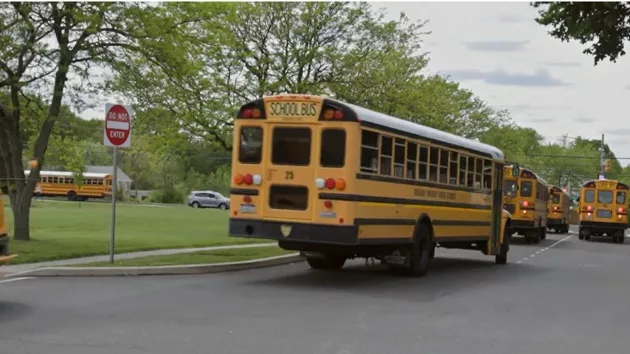
The pandemic created an education crisis in America, with more than 25% of students nationwide chronically absent, missing 10% or more of classes, according to the U.S. Department of Education.
The places most affected by truancy are Alaska, with 49% of students chronically absent; followed by Washington, D.C., with 48%, and New Mexico with 40%, according to a Stanford University study.
In Nashville, Tennessee, school officials have created a truancy court to address chronic absenteeism. If a student fails to show up to the classroom for more than 15 days, they can be called to a truancy court. The state has 20% chronic absenteeism.
“Absenteeism creates gaps in learning,” Carol Brown, the Director of Attendance for the Metro Nashville Public Schools, told ABC News. “It’s so important for families and students to understand that you got to be in class every single day. You know, again, that’s our motto with our ‘Attendance Matters’ campaign. Attendance matters all day, every day. That means being on time to school and staying all day.”
“So, we do utilize truancy court as an intervention,” Brown told ABC News. “Often it is the last intervention and a way to support families.”
“For students and families that are summoned to court, that simply means now you have to come in front of the magistrate and maybe talk through why you weren’t able to come to school, what barriers you’re facing, what supports you may need, and then again, how we can best support you,” she said.
Brown works directly with the Metro Student Attendance Center, which runs the truancy court. She says that speaking to the magistrate isn’t necessarily a punishment, but rather a way for the system to better understand why a student is facing the obstacles that are preventing them from attending class.
Magistrate Alan Calhoun presides over truancy cases in Nashville.
“All their circumstances are different,” Calhoun said of the students and parents who appear in his courtroom. “You can be very different with a 16-year-old than you can with a parent of a 9-year-old who’s missing school. They’re oftentimes very different problems.”
Calhoun says the more school a student misses, the more they are likely to drop out of school entirely. In 2021, there were 2 million dropouts nationwide, down from 2.8 million in 2010.
“So even if you miss a lot of school when you’re in second grade, it can be a red flag for your odds of graduating high school,” Calhoun said. “When you see kids who are slipping through the cracks, that’s lost potential to me. And it’s the sad thing that you don’t want to see.”
Calhoun says the team he works with comes up with strategies for each student. The Metro Nashville Public Schools and the Juvenile Court work with community organizations to ensure each family gets help – if someone is experiencing homelessness, that student and their family is then connected to the necessary support systems in the community.
But Calhoun says that sometimes the solution to going to school is simple – it’s finding joy.
“The one thing that they always say is my school attendance problem was fixed because my student is enjoying school more,” Calhoun said. “It’s typically a welcoming school environment where a kid is valued. And so, in the end, if I could say one thing, it’s you’ve got to figure out ways to make those connections.”
But Sonya Douglass, a professor of education and leadership, says she’s personally disappointed by the current education system.
“I think we continue to focus on what students aren’t doing and why they aren’t doing it, and not looking at the real source of the problem, which is the system that we have created,” said Douglass, who is founding director of the Black Education Research Collective at Teachers College of Columbia University. “And so, it’s time to reimagine that system and change it to adapt to the needs of the 21st century.”
“The education system is working for some and not for others,” Douglass told ABC News.
According to the National Center for Education Statistics, dropout rates vary by race and ethnicity. In 2021, the total dropout rate for 16- to 24-year-olds was 5.2%. Whites dropped out at a rate of 4.1%, while Blacks and Hispanics dropped out at a rate of 5.9% and 7.8%, respectively. American Indians/Alaska Natives dropped out at a rate of 10.2%.
Across the nation, both federal and local programs have been put into play to try to address the issues of truancy. In Los Angeles, school superintendent Alberto Carvalho has gone door to door; in Alabama, signs stressing the importance of attendance are displayed on front lawns; in Philadelphia, local programs have been established that send out text messages to potentially truant youths’ parents.
“I think that although local communities are doing a lot to increase student attendance, we really have to spend more time understanding the root causes,” Douglass said. “The research has shown that they are so varied, and it really depends on the community and the individual student. And so, until we really identify the root cause, it’s going to be hard to engage in activities that are going to bring students to school.”
While absenteeism is not new, the COVID-19 pandemic amplified the problem. Students are missing school for myriad reasons, at a higher rate. Experts point to sickness, anxiety, depression, taking care of a sibling, transportation and homelessness as common reasons why students fail to keep showing up to school.
“There’s a wide range of reasons why students may miss school,” Douglass said. “We are now at a moment where we need to determine what the future of public education is in this country. What type of nation do we want to be? And what type of public education system do we need to create to make that a reality? And so we’re at a crossroads, if you will.”
ABC News’ Byron Pitts, Lizann Robinson, Mack Muldofsky, Lauren DiMundo, Caroline Kucera, and Deb Jones contributed to this report.
Copyright © 2023, ABC Audio. All rights reserved.





